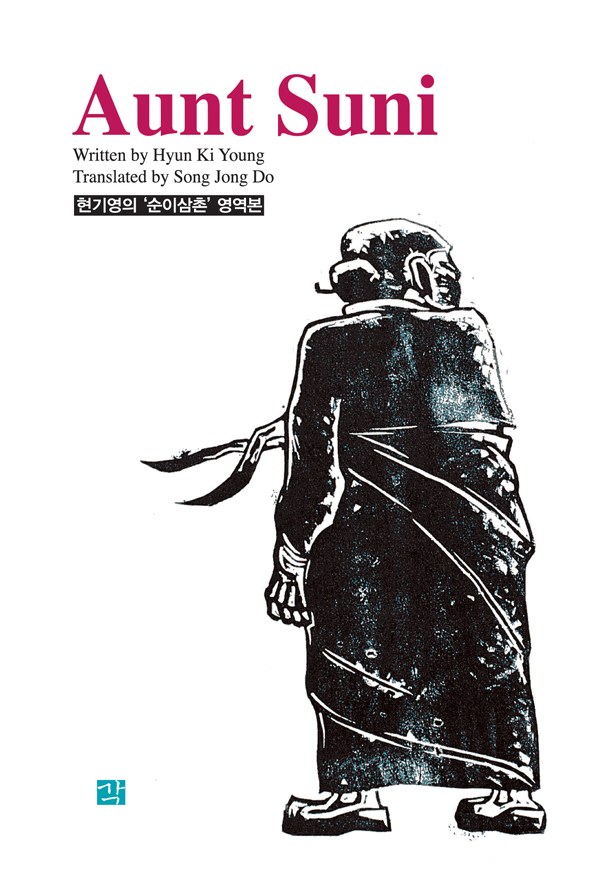
- Updated 2024.5.16 16:06
- All Articles
-
member
icon
-
facebook
cursor
-
twitter
cursor
|
CommunityInterviews |
Jeju massacre novella still sends powerful testimonyDespite limitations, English translation of ‘Aunt Suni’ highlights personal stories of tragedy |
|
| |
 |
|
| ▲ Photo courtesy Gak Publishing Company |
Words are powerful. There is no doubt about it. Within each word lives an idea and though that idea changes and grows as the word ages, there are no two words alike. Let no one tell you there is such a thing as a true synonym, for a word carries its own idea, no matter how similar two ideas may be.
That is the major problem with Hyun Ki Young’s ground breaking novella about the April 3, 1948 Jeju massacre, “Aunt Suni,” which is translated by Song Jong Do.
Released in 1979, the book has been credited as “the first public mention of the 4.3 events and massacres after two decades of total silence,” according to Kim Hun Joo, in his paper “Seeking truth after 50 years: The National Committee for Investigation of the Truth about the Jeju 4.3 Events.” Soon after the book’s publication, Hyun was arrested and tortured by government agents and “Aunt Suni” was banned.
This translation of “Aunt Suni” was published in 2008 and while still readable, the translation is so shoddy that the reader is confused about who is speaking and occasionally about what is actually occurring. In fact, the name of the titular character is spelled two different ways and with every possessive proper noun there is a space after the apostrophe (Aunt Suni’ s). This deters the reader from being engrossed in an otherwise riveting if gruesome story.
The novella begins with the protagonist, on his way home to Jeju after an 8 year absence. His name is mentioned once in the book but it is not clear if it is his name or the name of his elder uncle’s wife’s son (that is how relations are mentioned). The character is returning for his grandfather’s memorial service, who died 30 years ago during the April 3 massacre.
He arrives to the news that several days ago Aunt Suni, their close neighbor (though not an actual blood relation) had committed suicide in a field on her farm. What ensues is an oral depiction of what happened 30 years ago to the day when the entire town was slaughtered by government troops and the North West Youth League of Pyongyang. While the family recounts the horrific events, the entire village becomes consumed by the sound of households wailing and sobbing for those they lost on that terrible day.
It is an interesting and informative story that depicts the massacre as Jeju citizens caught in the middle of the battle between the communist guerrillas and the government. The people were terrorized and died at the hands of both sides, though predominately to those of the army.
One of the ways this innocent situation is shown is through the protagonist’s elder uncle. The man, who was once a member of the North West Youth League, married the protagonist’s aunt by her father to protect her from being raped and tortured. His character is used to illuminate the fact that neither side is completely guilty or innocent. That only those who were caught in the middle of their political and physical battle, who lost their lives or families are free of blame.
Aunt Suni’s character stands as a metaphor for all those who suffered during the event, and were never truly able to carry on.
It is a wonderful story, though the translation needs a solid proofreading, but even still, the book should be read by all interested in what happened during the April 3 massacre. As opposed to what hangs at the 4.3 peace museum, this is a personal depiction of what occurred, full of emotion, specifics and most importantly, it gives those who were not able to speak out or tell their story the words to do so.
|
|
|
|
|
|
|
|
|
|
 Darryl Coote의 다른기사 보기 Darryl Coote의 다른기사 보기 |
|
ⓒ Jeju Weekly 2009 (http://www.jejuweekly.net)
All materials on this site are protected under the Korean Copyright Law and may not be reproduced, distributed, transmitted, displayed, published without the prior consent of Jeju Weekly. |
|
|
|
|
| Jeju-Asia's No.1 for Cruise |
|
|
|
Title:The jeju Weekly(제주위클리) | Mail to editor@jejuweekly.net | Phone: +82-64-724-7776 Fax: +82-64-724-7796
#503, 36-1, Seogwang-ro, Jeju-si, Jeju-do, Korea, 63148
Registration Number: Jeju, Ah01158(제주,아01158) | Date of Registration: November 10,2022 | Publisher&Editor : Hee Tak Ko | Youth policy: Hee Tak Ko
Copyright ⓒ 2009 All materials on this site are protected under the Korean Copyright Law and may not be reproduced, distributed, transmitted, displayed, published
without the prior consent of jeju weekly.com.

|




















